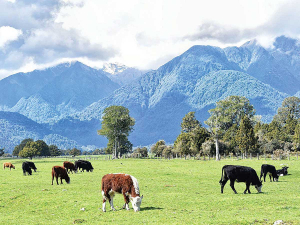Two new awards open to help young farmers progress to farm ownership
Entries have opened for two awards in the New Zealand Dairy Industry Awards (NZDIA) programme, aimed at helping young farmers progress to farm ownership.
 Fonterra says that pasture-based farming is what has kept the New Zealand dairy industry's footprint low.
Fonterra says that pasture-based farming is what has kept the New Zealand dairy industry's footprint low.
Fonterra says new analysis showing New Zealand dairy farms having the lowest carbon footprint in the world is a result of the country’s unique pasture-based farming.
Fonterra director of on-farm excellence, Charlotte Rutherford, says it also reflects the hard graft of the co-operative’s farmer shareholders.
“Which as an employee of the co-op makes me feel pretty proud,” says Rutherford.
“We’ve seen consumers become increasingly interested in the carbon footprint of their products, and today’s report confirms we’re well placed to meet people’s desire for food that’s kinder to the planet.
“We know more needs to be done to keep improving and we’re up for the challenge.”
Innovation is a key part of the co-op’s strategy and it has multiple partnerships to develop the tools and solutions needed to support farmers, particularly in areas where they face tough challenges, such as reducing methane emissions.
“One of the keys to helping guide farmers to continuously improve is ensuring they understand their emissions profiles,” she says.
“Last year, all our farmers received a greenhouse gas emission report specific to their farms. It’s a very practical step toward helping New Zealand meet climate change commitments.”
But finding a solution requires more than just hard graft from the co-op’s farmers and solutions like Kowbucha, seaweed and feed additives are being investigated for potential breakthroughs in reducing emissions from cows. Fonterra has also teamed up with Nestlé and DairyNZ to expand a promising plantain trial to help improve waterways and reduce on-farm greenhouse gas (GHG) emissions.
The report from AgResearch, commissioned by DairyNZ compares New Zealand with 17 other countries. It confirms our footprint is 70% lower than the global average and 46% lower than the average of other countries in the study, which includes all major milk producers.
With collars on more than seven million cows worldwide, Nedap says its standalone launch into New Zealand represents world-leading, reliable and proven smart technology solutions for dairy farmers.
The Meat Industry Association (MIA) is once again looking for game-changing ideas for New Zealand's red meat processing and exporting sector.
Environment Southland is inviting feedback on two bylaws that play a critical role in safeguarding the region's waterways and ensuring the safety of the local community.
While the North Island is inundated with rain, Southland is facing receding water levels as warm weather and lack of rainfall continues.
Entries have opened for the 2026 Fieldays Innovation Awards.
Organisers are expecting another full field of 40 of the country’s top shearers for the popular Speed Shearing event at this year’s Southern Field Days at Waimumu.